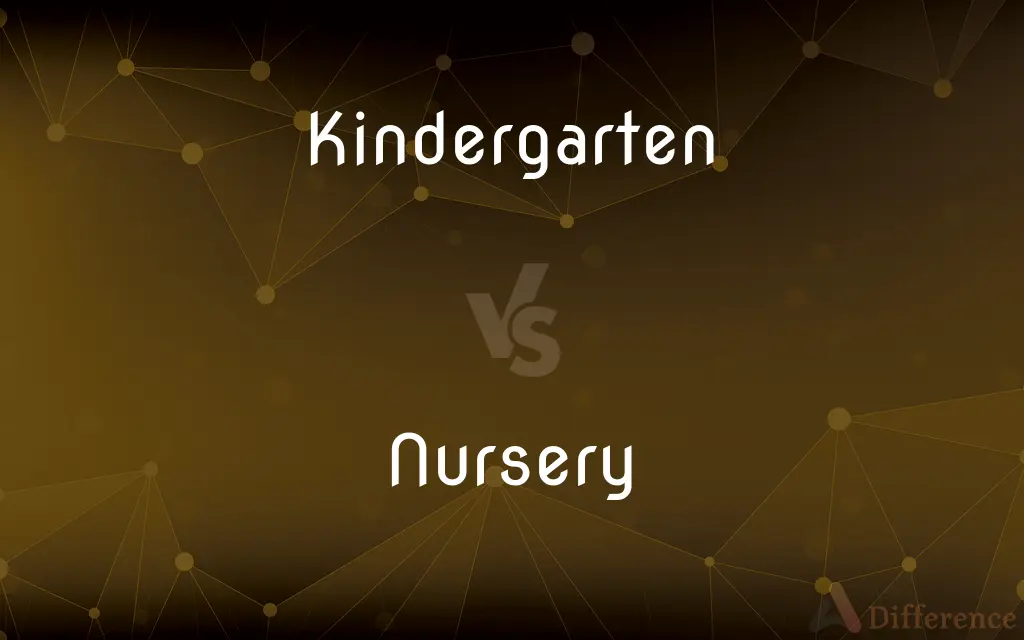Kindergarten vs. Nursery — What's the Difference?
By Tayyaba Rehman — Updated on October 29, 2023
Kindergarten is an educational class for young children, typically ages 4-6, focusing on foundational skills. A nursery provides care and supervision for infants and toddlers.

Difference Between Kindergarten and Nursery
Table of Contents
ADVERTISEMENT
Key Differences
Kindergarten marks the beginning of formal education, often including a structured curriculum with a focus on play-based learning. Nurseries, on the other hand, are places where babies and toddlers are cared for while their parents are at work.
In kindergarten, children learn basic math, alphabet, and social skills to prepare for primary school. Nurseries focus less on education and more on providing a safe environment for very young children to play and develop basic skills.
Teachers in kindergartens are usually certified educators who create lesson plans and educational activities. Nursery staff often include childcare workers who supervise play, feed, and attend to the children’s basic needs.
Kindergartens operate with a school calendar, typically on weekdays during school hours, mirroring a traditional school environment. Nurseries may have more flexible hours to accommodate working parents, often including full-day care.
While kindergarten is part of the education system and may have standardized assessments, nurseries are part of the childcare sector, focusing on nurturing and basic developmental milestones without formal testing.
ADVERTISEMENT
Comparison Chart
Age Group
Typically 4-6 years old
Infants to 3 years old
Focus
Foundational education, pre-literacy, and numeracy skills
Supervised care and play, early developmental activities
Staff
Certified teachers
Childcare providers, sometimes with early childhood education training
Hours of Operation
School hours, following an academic calendar
Often extended hours, year-round
Educational Approach
Structured curriculum with play-based learning
Less structured, more focus on caregiving and play
Compare with Definitions
Kindergarten
A program or class for young children designed to prepare them for elementary school.
He learned to read in kindergarten.
Nursery
Childcare services provided for young children, including infants.
She works at a nursery that specializes in early childhood development.
Kindergarten
A preschool educational approach for children aged 4-6 years.
My daughter is excited to start kindergarten this fall.
Nursery
A place for the care of young children, especially those under three years of age.
We found a nursery close to our home for our baby.
Kindergarten
The first year of school, focusing on social and basic academic skills.
In kindergarten, children learn to count to 100 and recite the alphabet.
Nursery
A room or organization where infants and toddlers are looked after while their parents are at work.
The nursery has a new outdoor play area.
Kindergarten
A classroom or institution for young children before they begin compulsory education.
The kindergarten was filled with colorful artwork and educational toys.
Nursery
An establishment offering supervised care and play opportunities for young children.
Our nursery is open from 7 AM to 6 PM.
Kindergarten
The first formal, organized learning setting that a child attends.
Kindergarten graduation marks the start of a child's educational journey.
Nursery
A setting for early childhood care, often involving play-based activities.
The nursery provides a nurturing environment for children to grow.
Kindergarten
Kindergarten (, US: (listen)) is a preschool educational approach based on playing, singing, practical activities such as drawing, and social interaction as part of the transition from home to school. Such institutions were originally made in the late 18th century in Bavaria and Alsace to serve children whose parents both worked outside home.
Nursery
A room or area in a household set apart for the use of children.
Kindergarten
(in Britain and Australia) an establishment where children below the age of compulsory education play and learn; a nursery school.
Nursery
A place for the temporary care of children in the absence of their parents.
Kindergarten
A program or class for four-year-old to six-year-old children that serves as an introduction to school.
Nursery
A nursery school.
Kindergarten
An educational institution for young children, usually between ages 4 and 6; nursery school.
Nursery
A place where plants are grown for sale, transplanting, or experimentation.
Kindergarten
The elementary school grade before first grade.
Nursery
A place in which something is produced, fostered, or developed.
Kindergarten
(Philippines) The two levels between nursery and prep; the second and third years of preschool.
Nursery
(countable) A place where breastfeeding]] or the raising of children is carried on.
Kindergarten
A class within a primary school or a separate school for young children, usually between the ages of four and six years, designed to adapt children to the classroom environment before beginning academic training, on the theory that education should be begun by gratifying and cultivating the normal aptitude for exercise, play, observation, imitation, and construction; - a name given by Friedrich Froebel, a German educator, who introduced this method of training, in rooms opening on a garden.
Nursery
(by extension) Especially in European countries: a room or area in a household set apart for the care of children.
Kindergarten
A preschool for children age 4 to 6 to prepare them for primary school
Nursery
A place where the pre-school children of working parents are supervised during the day; a crèche, a daycare centre.
Nursery
A play]] at the same time.
Nursery
(Philippines) The first year of pre-school.
Nursery
A place where anything is fostered and growth promoted.
Nursery
A place where animals breed, or where young animals are naturally or artificially reared (for example, on a farm).
Nursery
(horticulture) A place where young shrubs, trees, vines, etc., are cultivated for transplanting, or (more generally) made available for public sale, a garden centre; also (obsolete) a plantation of young trees.
Nursery
(sports) A club or team for developing the skills of young players.
Nursery
(countable) Something which educates and nurtures.
Commerce is the nursery of seamen.
Nursery
Someone or something that is nursed; a nursling.
Nursery
The act of nursing or rearing.
Nursery
The act of nursing.
Nursery
The place where nursing is carried on
Christian families are the nurseries of the church on earth, as she is the nursery of the church in heaven.
Nursery
That which forms and educates; as, commerce is the nursery of seamen.
Nursery
That which is nursed.
Nursery
A child's room for a baby
Nursery
A building with glass walls and roof; for the cultivation and exhibition of plants under controlled conditions
Common Curiosities
What services does a nursery provide?
A nursery provides care, supervision, and developmental activities for infants and toddlers.
What subjects are taught in kindergarten?
Kindergarten covers basics like the alphabet, numbers, shapes, and social skills.
Is kindergarten considered part of the compulsory education system?
Yes, kindergarten is often the first stage of compulsory education in many places.
Can a nursery be part of a private home?
Yes, some nurseries operate within private homes, known as family daycare.
What is the teacher-to-child ratio in nurseries?
This varies but is generally higher than in kindergarten to ensure close supervision.
At what age do children attend kindergarten?
Children typically attend kindergarten around ages 4-6.
Is attendance at kindergarten mandatory?
It can be, depending on local education laws.
Are nurseries available year-round?
Many nurseries offer year-round care to support working parents.
Do children in kindergarten take naps?
Yes, many kindergarten schedules include a rest or nap time.
Do nurseries have educational curricula?
While some may incorporate educational elements, nurseries primarily focus on care and play.
Are kindergartens regulated by educational authorities?
Yes, kindergartens are regulated and staffed by qualified educators.
Can kindergartens be part of elementary schools?
Often, kindergartens are integrated into elementary schools.
Do nurseries provide meals?
Many nurseries provide meals and snacks as part of their services.
Is a nursery the same as a preschool?
No, nurseries are for younger children and focus more on care than education.
Is play important in kindergarten?
Yes, play is a key component of learning in kindergarten.
Share Your Discovery

Previous Comparison
Steelhead vs. Salmon
Next Comparison
Performance vs. AbilityAuthor Spotlight
Written by
Tayyaba RehmanTayyaba Rehman is a distinguished writer, currently serving as a primary contributor to askdifference.com. As a researcher in semantics and etymology, Tayyaba's passion for the complexity of languages and their distinctions has found a perfect home on the platform. Tayyaba delves into the intricacies of language, distinguishing between commonly confused words and phrases, thereby providing clarity for readers worldwide.













































